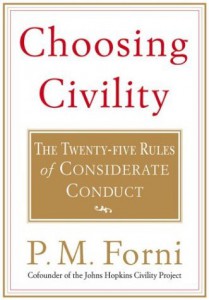Saturday
Featured StoriesRediscovering Civility
By Angela Pressburger
“Good manners are the pedestrian activity of goodness.”
My friend, Halifax sangha member Torgny Vigerstad, was half-listening to the radio when he heard those words and began to give the program his full attention. Later, when our paths crossed, he mentioned the experience to me and suggested I find out more.
The speaker was Dr. Pier Massimo Forni, a professor of Italian literature at Johns Hopkins University and co-founder of the Johns Hopkins Civility Project. “One day, while lecturing on the Divine Comedy,” recounts Forni, “I looked at my students and realized that I wanted them to be kind human beings more than I wanted them to know about Dante.” And so the Civility Project was born, and subsequently the book, Choosing Civility, was written.
Choosing Civility:
The Twenty-Five Rules of Considerate Conduct
Pier Massimo Forni
St. Martin’s Griffin, Paperback
ISBN: 0312302509
Choosing Civility is a small, almost pocket-size paper-back book that is part essay on the importance of courtesy, politeness, good manners and civility and part a list of 25 suggestions, or ‘rules,’ for putting these qualities into daily practice. It makes a case for making civility a central concern in our lives.
In these days where daily life is buffeted by stress and anonymity, it is hard to find any moral compass, and we are searching for the courage to do what we innately feel to be the ‘right’ thing. We have become overly concerned about financial gain and professional achievement; and where community was once important, we now tend to see others as a means to the satisfaction of our desires rather than ends in themselves. As an antidote, Forni suggests growing community and connections. And as a first step in this direction, he suggests maintaining a constant awareness that no human encounter is without consequences. And, in an encounter, civility is the place “where your difficult life and mine find a harmonious way to co-exist….We don’t want the appearance of good manners, but the substance of basic goodness and decency….”
Forni takes as his basic premise the first of the buddha’s Four Noble Truths, that life is suffering or, as he puts it, ‘difficult.’ We are stumbling, fumbling, mumbling around our world, and in that situation, civility, a code of behavior based on respect, restraint and responsibility, can help. Through its exercise, we can become effective managers of our actions and emotions so that we can connect successfully with others. To achieve good manners, Prof. Forni suggests, we must learn to practice self-restraint. “Manners,” he says, “are a discipline that provides for generosity of spirit” and the practice of this generosity results in the creating of bonds, of connection, with others and our world. Sound familiar?
In such a discussion, about the underlying ethics of community, we are reminded that the etymology of civility is based in the latin ‘civitas,’ the city-state, and that ‘civilitas’, which became civility in English, referred to the conduct becoming to citizens in good standing, citizens willing to become the best they can be and to give of themselves for the good of the city. This seems to be to be an important concept for the creation of enlightened society and in Western terms, it is the underlying basis of such a society’s culture. Decorum has more to do with the beauty – outer, inner and secret – which arises in a society that practices civility.
Although so far Prof. Forni’s message has been taken up mainly by university students and faculties, and by the business world, it’s clear that an interest in civility is on the rise in North America. A civil exchange of decency and kindness have been shown to alleviate stress, make us healthier, and avoid the extreme situations of bullying, hate crimes, and worse that seem to be on the rise in the ‘civilized world.’ Just as meditation helps to calm the mind and allow us to see more clearly, so the practice of civility is the ground for creating a society based in fearlessness and gentleness.
Good manners, are something we do for our own sake as well as for others. They are good for us because as a basic code of relationship skills they help us manage our relationships, which are crucial to our well-being and health. Manners, from the Latin ‘manus’ or ‘hand,’ are a way of handling – the way we handle our daily encounters with others. North Americans are slowly awakening to the connection between civility and ethics, civility and health, and civility and quality of life. Civility is not trivial, because it allows us to be ethical agents in the most common of situations; it does the everyday busy-work of goodness. We are the world’s trustees – not just of the air we breathe and the water we drink, but of one another’s quality of life, contentment and happiness. Civility is the shape that such care takes.
So “say ‘yes’ to civility; this is the art of giving and receiving.” – P.M. Forni



















